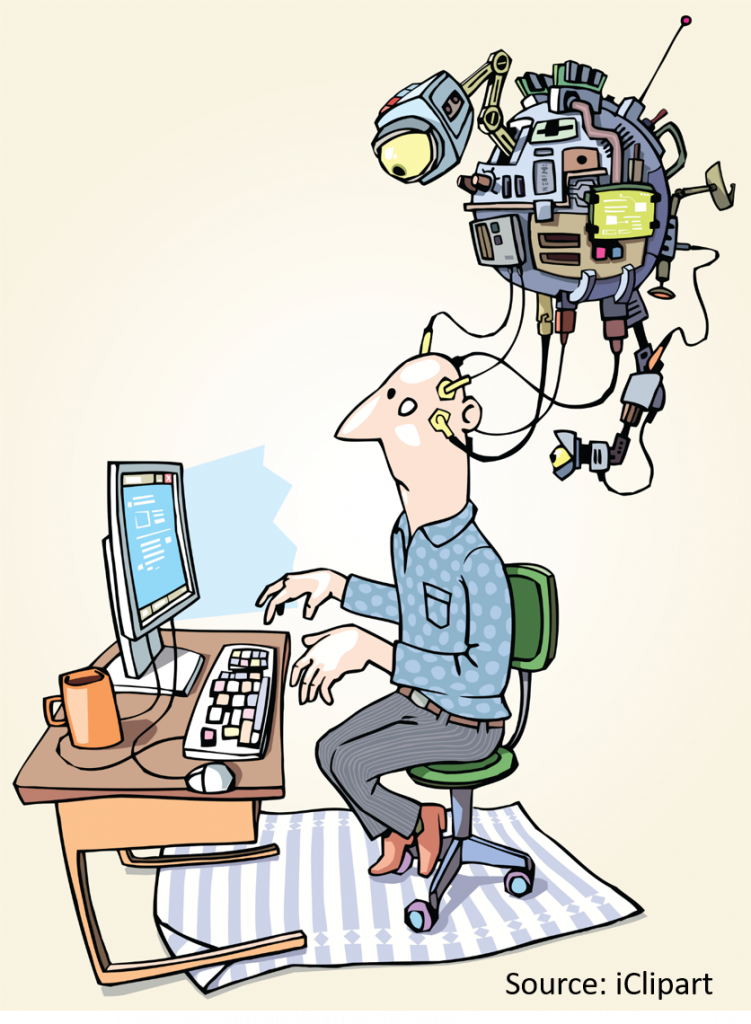Business executives get paid a lot of money because they are expected to make good decisions. Bain analysts, Michael C. Mankins and Lori Sherer (@lorisherer), assert if you can improve a company’s decision-making you can dramatically improve its bottom line. They explain, “We know from extensive research that decisions matter — a lot. Companies that make better decisions, make them faster and execute them more effectively than rivals nearly always turn in better financial performance.”[1] They add, “Not surprisingly, companies that employ advanced analytics to improve decision making and execution have the results to show for it.” Their assertion might lead some individuals to conclude that advanced analytics solutions (often embedded in cognitive technology platforms) are making the decisions rather than humans. That’s not the case, they note, “The need for human knowledge and judgment hasn’t disappeared — you still require skilled, experienced employees.”
In other words, they see advanced analytics and cognitive technologies augmenting, rather than replacing, human decision-making. They also believe augmented decision-making can be used to improve all sorts of decisions. They explain, “Small, everyday decisions … add up to a lot of value over time. … These decisions — both relatively frequent and individually important, requiring judgment and experience to make correctly — represent a potential gold mine for the companies that get there first with advanced analytics.” Daniel Araya (@DanielArayaXY), a technology consultant, observes, “Across a host of industries — medicine, engineering, entertainment, transportation, and design — AI and machine learning continue to introduce new innovations that augment human performance.”[2] According to Vivek Wadhwa (@wadhwa), a Distinguished Fellow at Harvard Law School Labor and Worklife Program, business executives shouldn’t be too concerned about losing their decision-making role to artificial intelligence (AI) systems. He explains, “AI is advancing rapidly and will surely make it easier to clean up and integrate data. But business leaders will still need to understand what it really does and create a vision for its use — that is when they will see the big benefits.”[3] Augmenting decision-making will surely provide some of those big benefits.
When using cognitive technologies in decision-making, the stress should be on “augmented”
Many of the brightest minds in the cognitive computing field believe augmenting human intelligence is the best path forward. Former IBM CEO, Ginni Rometty (@GinniRometty), explains, “[When IBM coined the term cognitive computing] the idea was to help you and I make better decisions amid cognitive overload. That’s what has always led us to cognitive. If I considered the initials AI, I would have preferred augmented intelligence. It’s the idea that each of us are going to need help on all important decisions.”[4] Elif Tutuk (@elif_tutuk), Director of Research at Qlik, agrees with that sentiment. She writes, “This new breed of AI is what we call ‘augmented intelligence.’ Essentially this means placing human intuition in the middle of data analytics and advanced algorithms.”[5] I would have replaced “intuition” with “reasoning”; however, the idea remains fairly clear. Tutuk adds, “By investing in cognitive computing platforms, businesses can look to extract contextual information as humans can, adapting as requirements and targets change. Unlike fixed algorithms, cognitive computing platforms can resolve ambiguity and tolerate unpredictability, using probability to support decisions even with little representative data.” The Enterra Solutions® cognitive computing system, the Enterra Cognitive Core™ — a system that can Sense, Think, Act, and Learn® — is an example of an augmented intelligence platform that can enhance corporate decision-making.
Accenture analysts Paul R. Daugherty (@pauldaugh) and H. James Wilson (@hjameswilson) note, “New AI capabilities that can recognize context, concepts, and meaning are opening up surprising new pathways for collaboration between knowledge workers and machines. Experts can now provide more of their own input for training, quality control, and fine-tuning of AI outcomes. Machines can augment the expertise of their human collaborators and sometimes help create new experts.”[6] They add, “Engineers and pioneers across disciplines are designing AI so that it is more easily trained and evaluated by experts and can incorporate their extremely valuable and often scarce knowledge. … Just as today’s machine learning systems augment the capabilities of ordinary workers, tomorrow’s systems will elevate the performance of knowledge workers to previously unattainable levels of uniform excellence.”
Making the most of augmented intelligence
As Tutuk noted above, cognitive computing platforms can resolve ambiguity and tolerate unpredictability. Falon Fatemi (@falonfatemi), founder and CEO of Node, prefers the term “artificial intuition” for these kinds of cognitive insights. She told journalist Alyssa Newcomb (@AlyssaNewcomb), “It essentially turns data into decisions — both the context-specific that it’s analyzing within an application, and also learning from the intuition that the end-users have as to where they’re most successful. … Everyone should have their own artificial intuition agent whose job is to identify opportunities to you and put those in front of you before you even know to search for them.”[7] Like other tech experts, Joe McKendrick (@joemckendrick) prefers the term augmented intelligence. He explains, “Augmented intelligence describes the essence of the technology in a more elegant and accurate way.”[8]
Naveen Joshi, Founder and CEO of Allerin, writes, “Augmented intelligence has displayed unmatched potential in multiple industry sectors such as healthcare, retail, finance, manufacturing and many more. Just about every organization is already deploying or planning to use augmented intelligence for various applications. The ability of augmented intelligence to improve human capabilities has proved to be fruitful in the workplace. With the help of augmented intelligence, employee performance, productivity, and experience can grow at a staggering rate. Organizations must exploit augmented intelligence to its maximum potential to gain the best possible results and maintain a competitive edge.”[9] He goes on to describe four ways augmented intelligence can benefit companies. They are:
1. Automating tasks in the workplace. “Augmented intelligence can effectively improve workplace productivity by automating various tasks. Routine and admin tasks require a workforce and consume a significant chunk of employee time. Such tasks can be easily automated with the help of augmented intelligence.” Specifically, Joshi is writing about robotic process automation (RPA), which has been described as a gateway technology to AI.
2. Transforming employee roles. “Augmented intelligence can only automate certain business processes. According to McKinsey, less than 5% of occupations can be automated with current technology. … As a result, every employee will still be required to do a major portion of their job that requires critical thinking, experience, imagination and creativity. Employees can also take over fresh work opportunities.”
3. Rethinking learning and development. “Employees need to be aware of modern technologies to successfully implement their applications for the benefit of the organizations. For this purpose, organizations have to train their employees in using such applications to solve real-world challenges. Business leaders have to revamp their corporate training and development programs to include emerging technologies. Since every employee may not be tech-savvy, personalized learning must be a priority for organizations.”
4. Introducing new jobs. “Many people are concerned that the rise of automation and augmented intelligence will lead to a world where machines are stealing all the jobs. However, there are multiple reports that suggest a different scenario altogether. According to reports, AI will create 113 million new jobs and displace 75 million of them.” One of those new jobs, Joshi asserts, will be “high-level advisors [that] require personnel who can communicate with customers, understand their requirements and provide professional advice using analytics.”
Concluding thoughts
Tutuk concludes, “Despite the key role that automation and advanced algorithms must play in data analytics, the ideal model will always put humans at the center. After all, we humans bring awareness, perception and ultimately decision making.” The world will be a better place if humans are augmented, rather than replaced, by cognitive and other advanced technologies.
Footnotes
[1] Michael C. Mankins and Lori Sherer, “Creating value through advanced analytics,” Bain Brief, 11 February 2015.
[2] Daniel Araya, “3 Things You Need To Know About Augmented Intelligence,” Forbes, 22 January 2019.
[3] Vivek Wadhwa, “Don’t believe the hype: Artificial intelligence isn’t taking over business decision-making,” The Washington Post, 16 March 2018.
[4] Megan Murphy, “Ginni Rometty on the End of Programming,” Bloomberg BusinessWeek, 20 September 2017.
[5] Elif Tutuk, “Placing humans at the centre of Artificial Intelligence,” TechRadar Pro, 17 April 2019.
[6] Paul R. Daugherty and H. James Wilson, “Using AI to Make Knowledge Workers More Effective,” Harvard Business Review, 19 April 2019.
[7] Alyssa Newcomb, “Artificial Intuition Wants to Guide Business Decisions. Can It Improve on ‘Going With Your Gut’?” Fortune, 11 July 2019.
[8] Joe McKendrick, “Why AI Should Rightfully Mean Augmented Intelligence, Not Artificial Intelligence,” Forbes, 29 June 2019.
[9] Naveen Joshi, “While We Wait For Artificial Superintelligence, Let’s Make The Most Of Augmented Intelligence,” Forbes, 3 June 2019.





